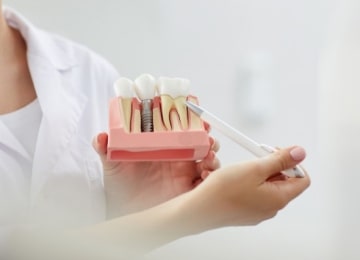Dental Implants – Topeka, KS
A Reliable, Modern Answer for Missing Teeth

Dental implants may be newer than other forms of tooth replacement, but they have already been around for decades. They have been shown to reliably offer a more permanent, stable solution for tooth loss thanks to the many unique benefits that they have to offer. Are dental implants the best choice for filling in the gaps in your own smile? You can find out by calling Westport Dental and scheduling a consultation with our team.
Request an appointmentWhy Choose Westport Dental for Dental Implants?
- In-House Implant Surgery
- Focus on High-Quality Care
- Friendly, Knowledgeable Dental Team
What are Dental Implants?

The actual dental implant is a small post. It’s normally made out of titanium, although we can also offer zirconia posts depending on your needs. Unlike bridges that use natural teeth for support, and dentures that sit on your gums, dental implants interface with your jawbone, forming a bond with it so that it can replace the root structures of your missing teeth. A fully integrated dental implant will prevent your restorations from failing, slipping, and shifting in your mouth.
The 4-Step Dental Implant Process

- Step 1: You can schedule an initial implant consultation, during which we’ll take X-rays of your mouth and review your medical history. We can figure out whether you’re a candidate for implants and plan the rest of your procedure accordingly.
- Step 2: Surgery is performed to place your dental implants in your jawbone. This step can be performed right here in our office.
- Step 3: We will wait about 3 to 6 months for your implant to fuse with the jawbone (the process of which is called osseointegration) before we attach a connector piece called an abutment to the post.
- Step 4: We’ll secure a customized restoration (meaning a crown, bridge, or denture) to the implant post(s) using the abutment(s).
Benefits of Dental Implants

As more people discover the benefits of dental implants, the treatment becomes more widespread, with about 500,000 new implants being placed each year. Some of the biggest advantages to getting new teeth that are supported by dental implants are:
- Having new tooth roots that will prevent your jaw from breaking down
- Providing the rest of the face with support to prevent sagging
- Looking and feeling like natural teeth
- Having a longer lifespan compared to others
Who Dental Implants Can Help

Whether you’re just missing one or two teeth or have already lost an entire arch, you may be able to get dental implants to restore your smile. The process will be slightly different for every patient; for example, sometimes, bone grafts are required before implant surgery so that the jawbone is capable of supporting the posts. Furthermore, the number of implants you get depends heavily on how many teeth need to be replaced, as detailed below.
Missing Single Tooth

Even one missing tooth can throw off the balance of your bite and make it harder to eat a variety of foods. With just one dental implant and a crown, we can completely replace the tooth in question without having to alter any surrounding teeth to make room for a traditional dental bridge.
Missing Multiple Teeth

Just two implants can replace several teeth in a row. A bridge can be used to fill the gap with a crown on each end supported by an implant post. It is also possible to support a partial denture with implants; the number of posts needed depends on how many teeth are missing and where they’re located.
Missing All of Your Teeth

Dentures that are only held in place with natural suction might slip and shift, but thanks to dental implants, you can get an entire row of new teeth that stays in place at all times. It normally takes around four to eight implants to keep full dentures anchored in the mouth.
Understanding the Cost of Dental Implants

Since the dental implant procedure is different for every patient, so is the cost. The number of implants that need to be placed, the location where they’ll be placed, the use of anesthesia or sedation during surgery, and the kind of restoration they support can all affect the final price. Our team can go into more detail about the financial aspect of dental implants during your initial consultation, including ways to fit them into your budget more easily.
FAQ
What are Dental Implants, and how do they differ from other tooth replacement options?
Dental implants are small posts, typically made of titanium or zirconia, that interface with the jawbone to replace the root structures of missing teeth. Unlike bridges and dentures, implants prevent restorations from failing, slipping, and shifting, offering a permanent and stable solution.
What are the benefits of Dental Implants?
Dental implants provide new tooth roots, preventing jawbone breakdown, supporting the face to prevent sagging, looking and feeling like natural teeth, and having a longer lifespan compared to other tooth replacement options.
Who can benefit from Dental Implants?
Dental implants can help individuals missing one or two teeth, several teeth in a row, or all of their teeth. The process varies for each patient, and the number of implants required depends on the extent of tooth loss and the location of missing teeth.
How does the cost of Dental Implants vary, and what factors influence it?
The cost of dental implants varies based on factors such as the number and location of implants, the use of anesthesia or sedation during surgery, and the type of restoration. The Westport Dental team can provide detailed information on the financial aspects during the initial consultation, including options to fit implants into your budget.

